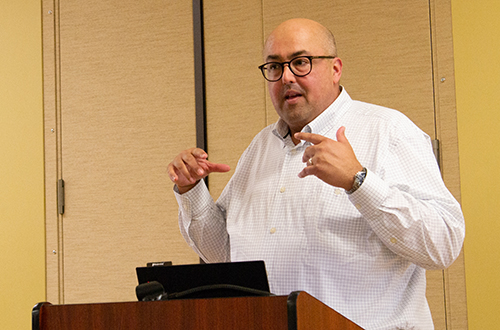
Media scholar Siva Vaidhyanathan acknowledges that he sounds like a “downer” when he discusses Facebook’s effect on democracy. But when he sees the dominant social media platform being used to promote nationalism and authoritarianism around the world, he can’t help it.
“Facebook is the ideal tool for those movements, and those movements figured that out,” the University of Virginia professor said during a visit to the University of Washington on May 16. “They could not have invented a better system for themselves.”
Vaidhyanathan, the author of “Antisocial Media: How Facebook Disconnects Us and Undermines Democracy,” was the featured speaker at the Information School’s seventh annual Ed Mignon Distinguished Lecture at the UW’s Samuel E. Kelly Ethnic Cultural Center. In his talk, he detailed how Facebook’s algorithms promote extremism in politics by prioritizing emotional responses to content and giving political groups a way to advertise with incredible precision.
He recounted how the 2016 Cambridge Analytica scandal exposed Facebook’s practices of harvesting and sharing data about its 2.3 billion users around the world. Vaidhyanathan said that while it was unwanted attention for Facebook, media coverage of the scandal exposed the effectiveness of Facebook’s platform.
“The narrative we’ve been getting, that these are Facebook screwups – that’s totally wrong,” he said. “These are examples of the domination and success of Facebook’s design and execution. It’s just getting a little bit embarrassing for Facebook. Everything they’ve built works a little too well.”
He showed the inner workings of Facebook’s advertising system and illustrated how efficiently it can target people based on their interests and demographics. In the 2016 U.S. presidential election, Donald Trump’s campaign used the system very effectively to either motivate his voters or demotivate Hillary Clinton’s voters. For example, the campaign targeted men of Haitian descent in Florida by reminding them of President Bill Clinton’s unmet promise to provide hurricane aid to Haiti after a hurricane.
While tactics like that may be considered fair play in American politics, Facebook’s massive scale, its use of algorithms to amplify emotional content, and its advertising power have led to a raft of problems, Vaidhyanathan said. Authoritarians have exploited Facebook in a growing list of nations, including the Philippines, India and Hungary. The platform has encouraged the spread of misinformation and hate speech, has led to the loss of data privacy, and has squeezed out many media outlets that can’t compete financially.
“If these are examples of Facebook succeeding and not failing, you can’t just tweak things at the edges,” he said. “The problem with Facebook is Facebook.”
Vaidhyanathan is the Robertson Professor of Media Studies and director of the Center for Media and Citizenship at the University of Virginia. His previous books include “Intellectual Property: A Very Short Introduction” and “The Googlization of Everything — and Why We Should Worry.” He is a frequent contributor to publications such as The New York Times, Slate, The Washington Post and The Guardian.
The Ed Mignon Distinguished Lecture in Information Science is named for an alumnus and former faculty member of what is now the iSchool. He passed away in January 2012. His wife, Molly Mignon, established a fund to provide support for an annual lecture by a distinguished speaker on a topic of interest in the field of information science. Speaker topics may be related to current events, policies, controversies, or issues in the information and technology fields. The goal is to inspire original thinking and foster creativity among students, faculty and researchers at the Information School.